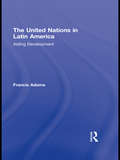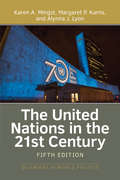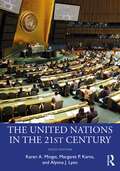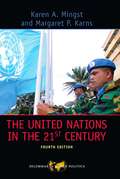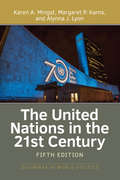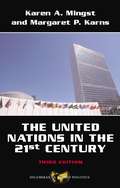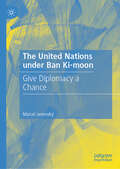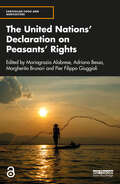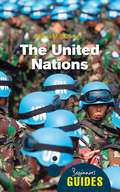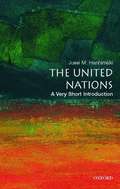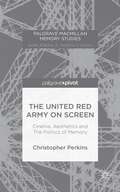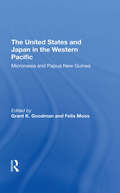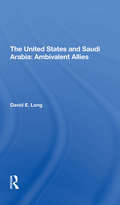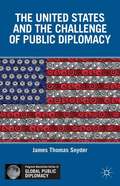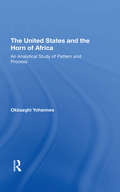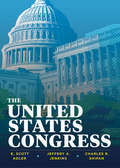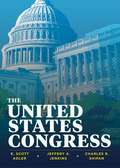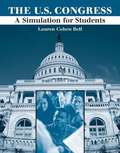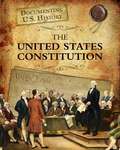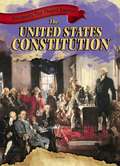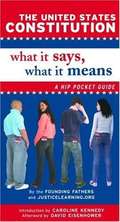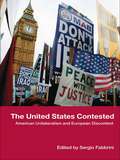- Table View
- List View
The United Nations in Latin America: Aiding Development (Routledge Studies in Latin American Politics)
by Francis AdamsThe United Nations has increased its worldwide efforts to promote sustainable development. In this book, noted scholar Francis Adams examines the United Nations' actions in Latin America, particularly in light of meeting basic human needs, promoting gender equity, and preserving natural environments. While previous books have focused on a single UN agency, this book is the first to analyze the development work of various UN institutions and agencies that sponsor economic and social programs in the developing world as well as the UN's various funding initiatives, global conferences, and institutional goals. This book will be a necessary addition for students and scholars of Latin American politics and Development.
The United Nations in the 21st Century
by Karen A. Mingst Margaret P. Karns Alynna J. LyonThe United Nations in the 21st Century provides a comprehensive yet accessible introduction to the United Nations, exploring the historical, institutional, and theoretical foundations of the UN. This popular text for courses on international organizations and international relations also discusses the political complexities facing the organization today.Thoroughly revised throughout, the fifth edition focuses on major trends since 2012, including changing power dynamics, increasing threats to peace and security, and the growing challenges of climate change and sustainability. It examines the proliferating public-private partnerships involving the UN and the debates over reforming the Security Council and the Secretary-General selection process. This edition also includes new case studies on peacekeeping and the use of force in the Democratic Republic of Congo and Mali, transnational terrorism and the emergence of ISIS, the Security Council's failure to act in Syria, the Syrian and global refugee/migrant crisis, and the conclusion of the Millennium Development Goals and framing of the Sustainable Development Goals.
The United Nations in the 21st Century
by Karen A. Mingst Margaret P. Karns Alynna J. LyonThe United Nations in the 21st Century, Sixth Edition, provides a comprehensive yet accessible introduction to the UN. It explores the historical, institutional, and theoretical foundations of the UN as well as major global trends and challenges facing the organization today, including changing major power dynamics, new threats to peace and security, the migration and refugee crises, the COVID-19 pandemic, and the existential challenges of climate change and sustainability. Thoroughly revised and expanded, it contains two new chapters on the UN and the environment and on human security, including issues of health, food security, global migration, and human trafficking. There is enhanced analysis of theoretical perspectives on post-colonialism, feminist theory, constructivism, and non-Western views. New content has also been added on the UN’s budget crisis, public–private partnerships, and the role of women in the organization. By examining the UN as an intergovernmental organization facing the broader need for global cooperation to address economic, social, and environmental interdependencies alongside the threats posed by rising nationalism and populism, this popular text is the perfect reference for all students and practitioners of international organizations, global governance, and international relations.
The United Nations in the 21st Century
by Karen A. Mingst Margaret P. KarnsIntended primarily as an undergraduate textbook, this volume covers the history and ongoing evolution of the United Nations, emphasizing its roles in international security, economic development and human rights. Mingst (diplomacy and international commerce, U. of Kentucky) and Karns (political science, U. of Dayton) have updated this new edition to cover the latest challenges facing the world. Specific additions include three new case studies and an entirely new chapter looking at the future relevance of the UN. Selected sections of the UN charter and a glossary are included. Annotation ©2012 Book News, Inc. , Portland, OR (booknews. com)
The United Nations in the 21st Century
by Karen A. Mingst Margaret P. KarnsThis popular text for courses on international organizations and international relations provides a comprehensive yet accessible introduction to the United Nations, exploring the historical, institutional, and theoretical foundations of the UN as well as the political processes and issues facing the organization today. Thoroughly revised throughout, the fourth edition focuses on major events since 2006, including the influence of emerging powers such as China, India, and Brazil, the crisis in UN peacekeeping, and the continuing decline of the UN's relevance in international economic relations. This edition also includes a new chapter on the future of the United Nations, as well as new case studies on peacekeeping in the Democratic Republic of Congo, human trafficking, and the challenges of state building for human security in Haiti. Helpful student resources include the Charter of the United Nations, a list of acronyms, suggested resources for additional research and reading, and a glossary.
The United Nations in the 21st Century
by Karen A. Mingst Margaret P. KarnsThis popular text for courses on international organizations and international relations provides a comprehensive yet accessible introduction to the United Nations, exploring the historical, institutional, and theoretical foundations of the UN as well as the political processes and issues facing the organization today. Thoroughly revised throughout, the fourth edition focuses on major events since 2006, including the influence of emerging powers such as China, India, and Brazil, the crisis in UN peacekeeping, and the continuing decline of the UN’s relevance in international economic relations. This edition also includes a new chapter on the future of the United Nations, as well as new case studies on peacekeeping in the Democratic Republic of Congo, human trafficking, and the challenges of state building for human security in Haiti. Helpful student resources include the Charter of the United Nations, a list of acronyms, suggested resources for additional research and reading, and a glossary.
The United Nations in the 21st Century (Dilemmas In World Politics Ser.)
by Karen A. MingstThe United Nations in the 21st Century provides a comprehensive yet accessible introduction to the United Nations, exploring the historical, institutional, and theoretical foundations of the UN. This popular text for courses on international organizations and international relations also discusses the political complexities facing the organization today.Thoroughly revised throughout, the fifth edition focuses on major trends since 2012, including changing power dynamics, increasing threats to peace and security, and the growing challenges of climate change and sustainability. It examines the proliferating public-private partnerships involving the UN and the debates over reforming the Security Council and the Secretary-General selection process. This edition also includes new case studies on peacekeeping and the use of force in the Democratic Republic of Congo and Mali, transnational terrorism and the emergence of ISIS, the Security Council's failure to act in Syria, the Syrian and global refugee/migrant crisis, and the conclusion of the Millennium Development Goals and framing of the Sustainable Development Goals.
The United Nations in the Twenty-First Century
by Karen A Mingst Margaret P KarnsThis revised edition provides students with an accessible and comprehensive introduction to the United Nations: its history, its organization, its role in global governance, and how it confronts the complex issues facing the world today.
The United Nations under Ban Ki-moon: Give Diplomacy a Chance
by Marcel JesenskýThis book chronicles the story of the United Nations under Secretary-General Ban Ki-moon in the decade 2007–2016. Marcel Jesenský provides a compelling account of the organization’s activities and Ban Ki-moon’s role in reconciling the aims, principles and prerogatives of his office, the organization and its Charter with the demands, interests and power of the member states. Today, as never before, the concept of the post–World War II multilateral framework of international relations tries to harmonize the claims for its reform and re-evaluation with growing demands to manage the globalized world. This work, invaluable for readers interested in global governance, multilateral diplomacy, the United Nations and international relations, presents its subject in historical context and provides answers to assist its understanding.
The United Nations' Declaration on Peasants' Rights (Earthscan Food and Agriculture)
by Mariagrazia Alabrese Margherita Brunori Adriana Bessa Pier Filippo GiuggioliThis is the first book to address and review the United Nations' Declaration on the Rights of Peasants and Other People Working in Rural Areas (UNDROP), which was adopted by the United Nations General Assembly in December 2018. Food security and sustainable agri-food systems, responsible governance of natural resources, and human rights are among the key themes of the new millennium. The Declaration is the first internationally negotiated instrument bridging these issues, calling for a radical paradigm change in the agricultural sector while giving voice to peasants and rural workers, recognised as the drivers of more equitable and resilient food systems. The book unfolds the impact of the Declaration in the wider realm of law and policy making, especially concerning the new human rights standards related to access and control of natural resources and the governance of food systems. The chapters in the book touch on a broad array of topics, including women’s rights, the role of and impact on indigenous peoples, food sovereignty, climate change, land tenure, and agrobiodiversity. Voices from outstanding scholars and practitioners are gathered together to inform and trigger a further debate on the negotiation process, the innovative and potentially disruptive contents, the relations with other fields of law, and the practical scope of the Declaration. The volume concludes with a collection of case studies that provide concrete examples to help us understand the potential impacts of the Declaration at regional, national, and local levels. This book is the first comprehensive tool to navigate the Declaration and is designed for students, researchers, and practitioners in the fields of food and agriculture law, peasant, agrarian and rural studies, human rights and environmental law, and international development and cooperation.
The United Nations, Peace and Security
by Ramesh ThakurEnding humanitarian atrocities has become as important for the United Nations as preventing interstate war. This book examines the transformation of UN operations, analysing its changing role and structure. Ramesh Thakur asks why, when and how force may be used, and argues that the growing gulf between legality and legitimacy is evidence of an eroded sense of international community. He considers the tension between the United States, with its capacity to use force and project power, and the United Nations, as the centre of the international law enforcement system. He asserts the central importance of the rule of law and a rules-based order focused on the United Nations as the foundation of a civilised system of international relations. This book will be of interest to students of the United Nations and international organisations in politics, law and international relations departments, as well as policymakers in governmental and non-governmental international organisations.
The United Nations: A Beginner's Guide (Beginner's Guides)
by Norrie MacqueenSince its inception in 1945, the United Nations has had a powerful but controversial influence on global politics. In this informative guide, Norrie MacQueen provides a clear and comprehensive introduction to its institutions, remit, personalities, and role in the modern world. Defending it from common criticisms of bureaucratic paralysis and bias towards the developed world, MacQueen argues that its limitations are due to the complex web of national interests that it seeks to reconcile.
The United Nations: A Very Short Introduction
by Jussi M. HanhimäkiThe United Nations has been called everything from "the best hope of mankind" to "irrelevant" and "obsolete." With this much-needed introduction to the UN, Jussi Hanhimäki engages the current debate over the organizations effectiveness as he provides a clear understanding of how it was originally conceived, how it has come to its present form, and how it must confront new challenges in a rapidly changing world. After a brief history of the United Nations and its predecessor, the League of Nations, the author examines the UN's successes and failures as a guardian of international peace and security, as a promoter of human rights, as a protector of international law, and as an engineer of socio-economic development. Hanhimäki stresses that the UN's greatest problem has been the impossibly wide gap between its ambitions and capabilities. In the area of international security, for instance, the UN has to settle conflicts--be they between or within states--without offending the national sovereignty of its member states, and without being sidelined by strong countries, as happened in the 2003 intervention of Iraq. Hanhimäki also provides a clear accounting of the UN and its various arms and organizations (such as UNESCO and UNICEF), and he offers a critical overview of how effective it has been in the recent crises in Rwanda and the former Yugoslavia, for example--and how likely it is to meet its overall goals in the future. The United Nations, Hanhimäki concludes, is an indispensable organization that has made the world a better place. But it is also a deeply flawed institution, in need of constant reform.
The United Red Army on Screen: Cinema, Aesthetics and the Politics of Memory (Palgrave Macmillan Memory Studies)
by Christopher PerkinsThe United Red Army on Screen.
The United States And Japan In The Western Pacific: Micronesia And Papua New Guinea
by Grant K Goodman Felix MoosThe interrelationships of the United States and Japan with Micronesia, a U.S. dependency, and Papua New Guinea, a newly independent nation, are the focus of this study. The authors demonstrate that dependence does not by any means automatically terminate by virtue of a legal change in political status. To a surprising extent, Micronesia (the last UN trusteeship) and independent Papua New Guinea depend for their very survival on the United States and Japan. The authors point out that the interests of the United States and Japan in this region too often–and unnecessarily–operate in isolation from one another and in direct conflict. Cooperative U.S.-Japanese efforts are vital in this area; whatever plans are made for the region, they must be island-specific, culturally congruent, politically sensitive, and economically viable.
The United States And Saudi Arabia: Ambivalent Allies
by David E. LongU.S.-Saudi relations have been marked by ambivalence since their inception over 50 years ago. The Arab-Israeli conflict, the division between buyer and seller of oil, the superpower-small state dichotomy, and the divergence of cultures, traditions, and perceptions have all contributed to the anomalies that have marked the relationship between the two countries, although mutual interest has, over time, outweighed mutual antagonism. Dr. Long examines the major factors affecting their association—economic, commercial, military, and political as well as oil-related factors—and develops the thesis that each has evolved a unique internal dynamic and an existence independent of the others. It is primarily in times of crisis that the factors have overlapped in the minds of decision makers, Saudi and American alike. The author argues that a knowledge of the development of each individual element is crucial for understanding the intricacies of current U.S.-Saudi relations.
The United States And The Challenge Of Public Diplomacy
by James Thomas SnyderThrough personal experience and a lively narrative, this book examines the difficulty of communicating in adversarial environments like Iraq and Afghanistan, the complexity of multi-linguistic communications, and the importance of directing American cultural power in the national interest.
The United States And The Horn Of Africa: An Analytical Study Of Pattern And Process
by Okbazghi YohannesThe recent collapse of the bipolar world order has been accompanied by momentous changes, dynamically setting the international system in motion toward an uncertain future. Such a profound transformation of the international system mandates an evaluation of American foreign policy and the role of the United States in this radically changed world order. In this insightful new book, Okbazghi Yohannes examines the role of U.S. foreign policy with regard to the four countries that make up the Horn of Africa: Eritrea, Sudan, Somalia, and Ethiopia. The book begins by analyzing the historical patterns and processes of American policy in relation to the African Horn during and after the Cold War, offering a comprehensive description of the fundamental policy choices of the United States and the means chosen to achieve American objectives in the region. Finally, Yohannes considers the extent to which the American role in the African Horn aided or impeded the emergence of political democracy and the promotion of economic development within the region. By juxtaposing this new method of examination with traditional approaches, the book reveals a greater coherence in the structural relationship between U.S. policy and the politics of the African Horn. Skillfully incorporating informative background material regarding the history, politics, and diplomacy of the countries covered by the study, Yohannes addresses the interests of both the specialist and the general reader.
The United States Congress (First Edition)
by E. Scott Adler Jeffery A. Jenkins Charles R. ShipanAn accessible approach to a modern Congress course Drawing on their extensive teaching experience, Scott Adler, Jeff Jenkins, and Chuck Shipan bring current political science into the classroom in an engaging, accessible way. Driven by vivid examples and clear writing, this comprehensive book teaches students to critically analyze Congress’s role as a representative and governing body. It examines Congress' key rules, structures, and procedures and its dynamic interactions with other institutions.
The United States Congress (Second Edition)
by E. Scott Adler Jeffery A. Jenkins Charles R. ShipanThe new standard for a modern Congress course Scott Adler, Jeff Jenkins, and Chuck Shipan bring current political science into the classroom in an engaging and accessible way. Driven by vivid examples and clear writing, this comprehensive text asks students to think critically about Congress’s role as a representative and governing body; its key rules, structures, and procedures; and its dynamic interactions with other institutions.
The United States Congress: A Simulation For Students
by Lauren Cohen BellSee Congress in action with THE UNITED STATES CONGRESS: A SIMULATION FOR STUDENTS! This student-friendly simulation guide provides you with the opportunity to learn new skills, such as Web-page design, legislative research and writing, and public speaking. The book includes tear out Worksheets, examples of legislation, Dear Colleague Letters, a Member's Daily Schedule, extensive reference materials, and advice for finding a job or an internship on Capitol Hill.
The United States Constitution (Documenting U.S. History)
by Liz SonnebornLearn about the United States Constitution, one of the most significant documents in U.S. history. Find out about those who were involved in its creation and why studying this primary source is so important.
The United States Constitution (Documents That Shaped America)
by Therese SheaDescribes the events surrounding the drafting and ratification of the U.S. Constitution, and looks at how it provides structure for the nation's government.
The United States Constitution: What It Says, What It Means
by Justicelearning. Org StaffAffordable, readable, and indispensable,The United States Constitution: What it Says, What it Means allows you to put the most important document in American history in your back pocket. In conjunction with Justice Learning and The Annenberg Foundation Trust at Sunnylands and with an introduction written by Caroline Kennedy and an afterword written by David Eisenhower, this pocket guide appeals to the broadest possible audience. Each Article and each Amendment is followed by a clear and concise explanation, in plain English, that is suitable for both middle and high school students. On December 8, 2004 President Bush officially signed Constitution Day into law. The law mandates that each year, on September 17th, schools and colleges that receive federal money are required to teach the Constitution. The new law was championed in Congress by Sen. Robert Byrd who famously carries around a copy of the document in his pocket. Sen. Byrd became increasingly alarmed at the lack of civics education-specifically relating to the Constitution-in our public schools and he wanted to take action. Lightweight, easy to use and easy for everyone to understand The United States Constitution: What it Says, What it Means is an excellent way for students and citizens of all ages to read and completely comprehend the building block of American democracy. Justice Learning (www. justicelearning. org), is a comprehensive on-line resource that offers wide-ranging non-partisan materials relating to civics education.
The United States Contested: American Unilateralism and European Discontent
by Sergio FabbriniWhy and how is America contested by Europe? This new book answers this question and contributes to a better understanding of contemporary transatlantic tensions. Adopting different theoretical perspectives, the leading contributors to this volume assess the European discontent with America and relate this to the unilateral turn of US foreign policy in the twenty-first century. American unilateralism is interpreted by all the authors as the expression of a new conservative nationalism which has been growing in the country since the 1970s and became culturally hegemonic after 9/11. They explore the following key areas: the rise of American conservative nationalism US foreign policy transatlantic relations anti-Americanism the Iraq War the future of American political and cultural hegemony. This book will be vital reading for students of international relations, foreign policy analysis, American and European politics.
